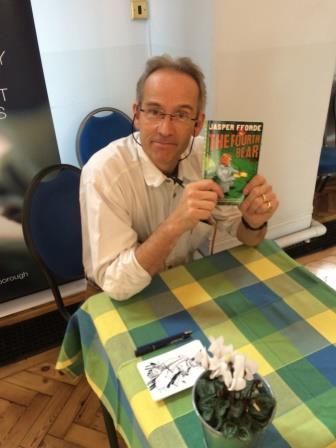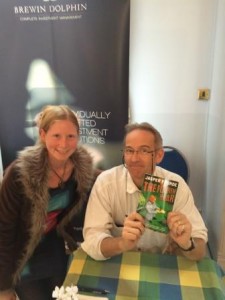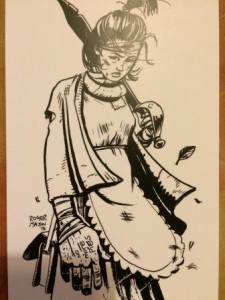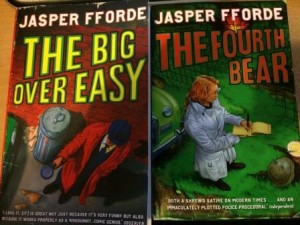
Jasper Fforde: pioneering fictioneer.
I’m not usually a fan of fantasy fiction. In fact, I actively avoid it, moving on as soon as I spot words like ‘magic’, ‘curse’ or ‘dragon’ in book descriptions and reviews. The one exception is Jasper Fforde, whose genuinely distinctive styling of comedy, fantasy, literary mash-up, satire and sci-fi is simply brilliant.
Recently, I had the privilege of seeing him give a talk at the Marlborough Literature Festival. (He was actually involved in two events, but since I’m now in my early thirties, (dear Lord, how’d that happen?) I thought I might not be *quite* the target audience for his Teens Writing Fiction workshop.))

Me, just about managing to cobble a few words together.
Anyway, I thoroughly enjoyed listening to Fforde talk about his writing process, how he became published and what the response to his books has been like. In fact, I found it so interesting that I soon started taking notes (on my phone since I had neglected to pack pen and paper, so hopefully no one saw me and thought I was texting or tweeting rather than listening!) What best to do with those notes? Obviously, turn them into an Interesting List Comprising Exactly 5 Interesting Things.* So here goes:
1. Fforde wasn’t that interested in school and left at 16 with one D grade GCSE in Art. Despite never completing any further formal education, he has now published 12 excellent novels.
2. He likes writing in the crime genre because, although he stresses that it’s a very tired genre – even if you move it to Scandinavia – he likes that crime fiction is basically “humans wanting justice”, and that’s a Good Thing.
3. When he first started sending manuscripts to publishers in the late 1980s he would deliberately stick pages three and four together so he could tell if anyone had actually read it when they returned it. They never had.

An Easter egg! Laura Scrubb: Warrior Princess
4. He likes to take the road less travelled and try to be original, which explains why Swindon is described in one of his Thursday Next books as ‘the jewel on the M4’.
5. He’s proudest of ‘Shades of Grey’ (no, not that [50] Shades of Grey), a dystopian novel set in a future where colour perception determines your life opportunities. It is undoubtedly more nuanced and carefully built than his Thursday Next series; unfortunately it hasn’t sold as well, which might explain why the plans for a prequel are still several books away (Fforde writes four different series so there can be long gaps between books within each series) and, although plans for a sequel exist, there is no planned timescale for writing or releasing it. Booo!!!!
He thinks genres are ‘the measles of the literary world’
6. He thinks genres are ‘the measles of the literary world’, forcing writers into tired old tropes and ultimately boring readers. He would prefer to categorise books more loosely, perhaps by the colour of their spines, and feels strongly that the most exciting part of the library is the oversized books section, where poetry runs up against guides to the railway and books on Pop Art. Who knows what you might find?
7. His stories begin as ‘narrative dares’; essentially he sets himself a challenge and then works out how the story would have to be shaped to achieve that result. For instance, what would happen if…someone took Jane Eyre out of Jane Eyre? (Find out in ‘The Eyre Affair’, which was his first published novel, though not the first novel he wrote.)
8. He wants to have fun with literature without being obscure. He chose Jane Eyre for his first Thursday Next book because everyone knows the bare bones of it, even if they’ve never read it, unlike ‘those drippy sisters in Sense and Sensibility’ or the five Bennet girls. (Personally I can’t imagine not knowing which Bennet girl Elizabeth is, but then we have already established that I am seriously slightly obsessed by P&P.)
So there you have it. If you’ve read anything by Fforde already, I hope this illuminated it in some way. If not, I hope I’ve inspired you to try him.
As for me, I picked up the first two instalments in his Nursery Rhyme series while at the festival and am very excited about reading them just as soon as I’ve finished my current mini-book pile.

Do I start with book one? Or the one about Goldilocks?